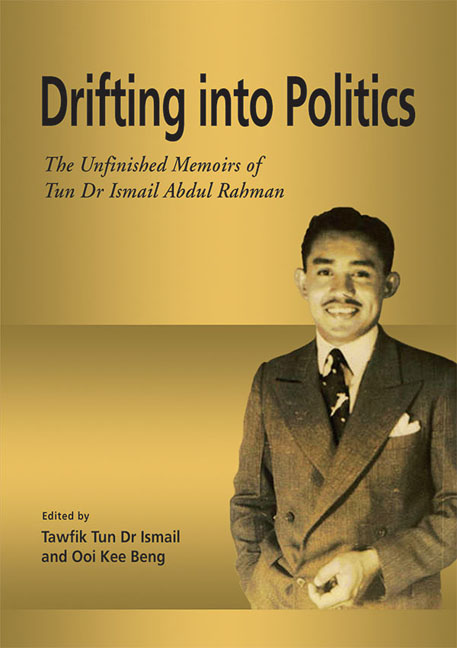Book contents
- Frontmatter
- Contents
- Preface
- INTRODUCTION
- CHRONOLOGY of Tun Dr Ismail bin Datuk Haji Abdul Rahman's Life (From The Reluctant Politician)
- REVIEW of The Reluctant Politician: Tun Dr Ismail and His Time (From Journal of the Malaysian Branch of the Royal Asiatic Society)
- Drifting into Politics: The Unfinished Memoirs of Tun Dr Ismail Abdul Rahman
- Chapter One
- Chapter Two
- Chapter Three
- Chapter Four
- Chapter Five
- Chapter Six
- Chapter Seven
- Chapter Eight
- Chapter Nine
- Chapter Ten
- Chapter Eleven
- Chapter Twelve
- Chapter Thirteen
- Chapter Fourteen
- Chapter Fifteen
- Chapter Sixteen
- Further Notes (30 March 1970)
- Further Notes (26 October 1972)
- Index
- About the Editors
Chapter Four
from Drifting into Politics: The Unfinished Memoirs of Tun Dr Ismail Abdul Rahman
Published online by Cambridge University Press: 19 May 2017
- Frontmatter
- Contents
- Preface
- INTRODUCTION
- CHRONOLOGY of Tun Dr Ismail bin Datuk Haji Abdul Rahman's Life (From The Reluctant Politician)
- REVIEW of The Reluctant Politician: Tun Dr Ismail and His Time (From Journal of the Malaysian Branch of the Royal Asiatic Society)
- Drifting into Politics: The Unfinished Memoirs of Tun Dr Ismail Abdul Rahman
- Chapter One
- Chapter Two
- Chapter Three
- Chapter Four
- Chapter Five
- Chapter Six
- Chapter Seven
- Chapter Eight
- Chapter Nine
- Chapter Ten
- Chapter Eleven
- Chapter Twelve
- Chapter Thirteen
- Chapter Fourteen
- Chapter Fifteen
- Chapter Sixteen
- Further Notes (30 March 1970)
- Further Notes (26 October 1972)
- Index
- About the Editors
Summary
POLITICS IN MALAYA IN THE IMMEDIATE POST-WAR PERIOD
A few weeks after my return from Australia, I already had the feel of politics in Malaya. My analysis of the events, occurring at that time was as follows: there was an awakening among countries under colonial rule after the Second World War. Nationalism, which was suppressed by the colonial powers before World War II, seized the opportunity created by the havoc and dismay of war to rear its head. It did so in Southeast Asia and its manifestations were so clear that those who were keen observers could not fail to see them. Malaya was heading for independence, of this I was certain. What I was not certain of was how long it would be before she finally achieved it. As I saw it, the pace would be dictated by the national leaders while the British would try their best to thwart them.
There was not a doubt that the man of the moment then was Dato Onn. He had mobilized Malay nationalism and directed it against the British. The question was how far he was prepared to go against the British — would he be prepared to lead the country to full independence or would he stop once Malay rights were restored? As a Malay leader, he was brilliant, and would have been eminently successful if the Malays formed an absolute majority in this country. He was not, however, big enough to face the realities of Malayan politics. Although towards the peak of his career he tried a Malayan solution rather than a Malay solution to the political situation in Malaya, he was not successful because he did not believe in what he was doing.
At this time, there were about half a dozen returned students living in and near Johor Bahru, including myself. We called our group “The Malay Graduates’ Association”. We used to meet fairly regularly to discuss politics. I usually get inspiration and ideas during the course of discussion and it was during such an occasion that this thought passed through my mind: I felt that if intellectuals such as ourselves wanted to play a role in the movement for independence, we had to be active in the right way and not be passive.
- Type
- Chapter
- Information
- Drifting into PoliticsThe Unfinished Memoirs of Tun Dr Ismail Abdul Rahman, pp. 21 - 25Publisher: ISEAS–Yusof Ishak InstitutePrint publication year: 2015



